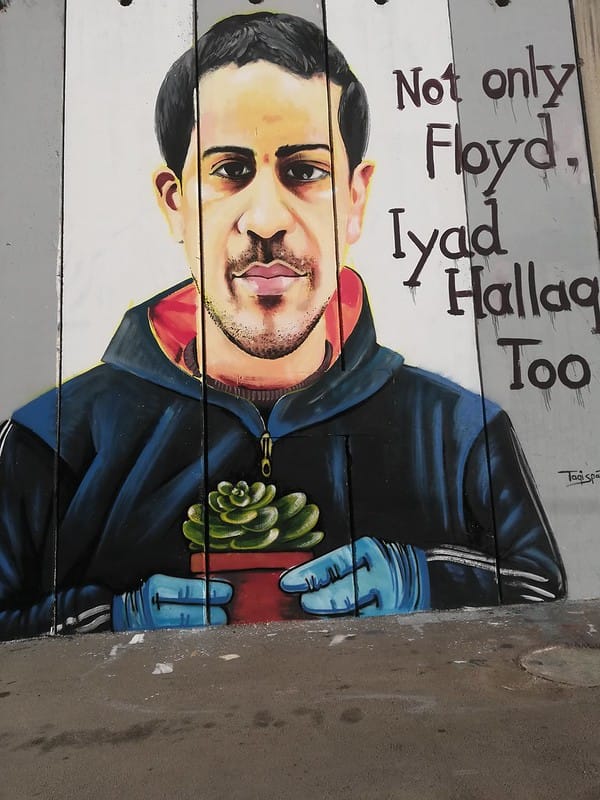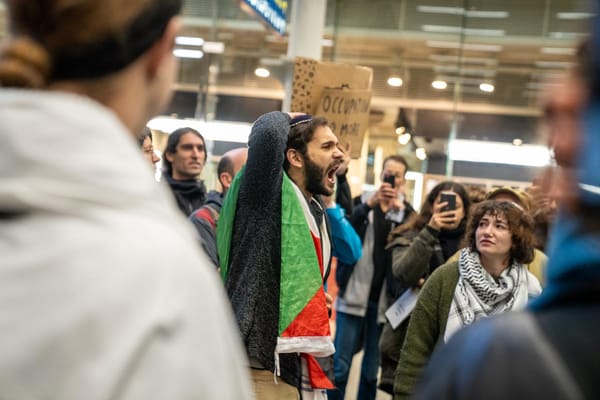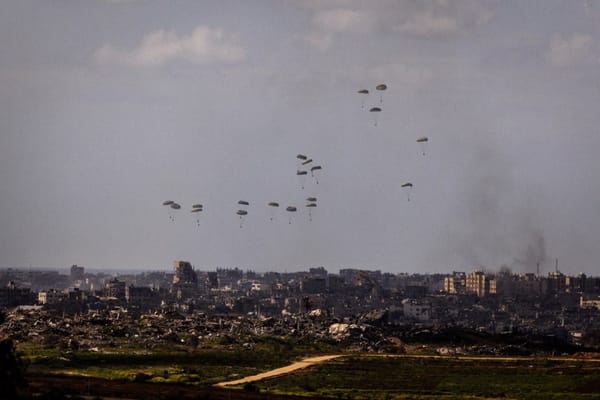If Black lives matter to us, Palestinian lives should too
George Floyd and Eyad Hallaq were killed in the same week. The British Jewish press has spilt much ink on the former – and barely a drop on the latter.

As the world knows, on 25 May, George Floyd was brutally killed while in police custody. As much less of the world knows, five days later, Eyad Hallaq, a 32-year-old autistic Palestinian with severe learning disabilities (he had a mental age of seven), was killed by Jerusalem police while under their control. He was on his way to his special-needs school.
I have personal experience of people with autism, and know that they often find their environment frightening. It appears this was true of Hallaq. Without knowing anything of the politics of the Israel-Palestine conflict, he was scared of Israeli police officers – and, it transpired, with good reason. His mother had given him a mobile phone to protect him. The police thought it might be a weapon, so they killed him.
The parallels are obvious. Both victims belong to groups with a strong sense of historical grievance. Both of those groups believe that the dominant majority regards their lives as cheap. Both were deliberately killed. Derek Chauvin could hear Floyd calling out for breath for several minutes before he became unresponsive. The Israeli police officer could not reasonably have believed Hallaq would survive the ten to twelve bullets he fired into his body.
The differences are also obvious. Floyd’s murder sparked mass protests throughout the United States and around the world, driving even coronavirus out of the headlines. Hallaq’s killing, on the other hand, has provoked scarcely a murmur. The protests in Israel have been small, the media coverage microscopic. The British press has scarcely made mention of it, and the British-Jewish press, which normally follows Israeli affairs assiduously, has not covered it at all. The Jewish Chronicle, with its record of anti-Palestinian racism, has used Floyd’s murder to preen itself on its antiracist credentials, while all but ignoring Hallaq (although they did publish my letter on the subject).
What conclusions can we draw from this? The obvious one is that Palestinian lives do not matter, not just in Israel, but in many other parts of the world. This cannot be news to anyone not afflicted by acute myopia. Examples are legion; I have many of my own. After 2014’s Operation Protective Edge, the chairman of one of the largest Jewish charities in the world sent an email to his board, of which I was then a member, lamenting the loss of life that summer, namely the sixty-seven Israeli soldiers who had been killed during the operation. I wrote back to him, inquiring about the more than two thousand Gazans who had also been killed (as far as I am aware, no one else raised this point); he replied that he did not wish to be controversial. This man was not vicious or racist – it was just that for him as for so many others, Palestinians, particularly dead ones, were invisible.
More recently, a settler living in Samaria was brutally killed by a terrorist, prompting justified outrage in the UK. I heard that in one London synagogue, the congregation broke out in a spontaneous rendition of the Hatikva after the rabbi’s sermon, in tribute to the murdered man. Then in December last year, the Israeli Air Force, looking for a terrorist, bombed a house in Gaza where they believed he was living. The Israeli armed forces have detailed knowledge of Gaza, but their intelligence failed them this time. There was no terrorist, just an ordinary Gazan family. The bombing killed nine members of the Suwarka family, including 12-year-old Mohannad, three-year-old Salim and three-month-old Firas. The deaths, like Hallaq’s, were not reported in the British press nor in the British Jewish press; I only found out about it from Haaretz. The response to the bombing that I heard from even quite dovish observers was that we could only take a view on its rightness or wrongness after a thorough investigation. They know as well as I do that that is not going to happen.
Another conclusion we may draw from all this is that the Israeli government’s aim is to kill rather than neutralise terrorists, even suspected ones. When the Israeli policeman fired the fatal shots, Hallaq was already lying on the ground, bleeding. His carer was calling out to the police in both Hebrew and Arabic that he had special needs. Hallaq himself called out, presumably in Arabic, that he was with her. Autistic people are generally very easy to spot. Was it necessary to dispose of him so quickly?
When killings like Hallaq’s occur, we are often reminded that Israel and the Palestinians are in conflict. Let us remember, however, that Hallaq’s killing took place in Jerusalem, not in the Territories. Israel has claimed sovereignty over the city for the last fifty years. Hallaq may not have had Israeli citizenship, but he was an Israeli subject, and as such, entitled to the state’s protection. If this is the treatment Palestinian citizens of Israel currently receive, what awaits those in the territory Israel is proposing to annex?
Another difference between Floyd’s killing and that of Hallaq is in the subsequent treatment of their families. Since Floyd was killed, his family has been visited by numerous celebrities, including the Democratic presidential candidate Joe Biden. Hallaq’s family have had a visit, too – theirs from the police who, having killed their son, raided their house, detained and allegedly assaulted a number of family members. While graphic images of Floyd’s killing have enraged protesters the world over, video footage of Hallaq’s last moments has yet to be released by the police; advisers to the Hallaq family were initially denied access to Eyad’s body. Meanwhile, Netanyahu refers to the event as a “tragedy”, as if describing an accident.
Is this the result of racism? If Hallaq had been Jewish and acting suspiciously, would the police have simply executed him? In a meeting I once chaired at the Board, a deputy stated that he did not care about dead Palestinians, only dead Israelis. For this, he was defended in the Jewish Chronicle. My rather banal response – that we as Jews should regard all human life as sacred – was attacked as a betrayal of Orthodox Judaism. Yet the acid test of this contention is to reverse the terms: how would we feel if “Jew” were substituted for “Palestinian”? If this deputy had said they did not care about dead Jews, only dead Palestinians?
The killing of George Floyd has led to a worldwide movement calling on us all to reflect on the darker side of our histories, and the role that racism has played and still plays in our lives. Hopefully it will lead to a reappraisal of the significance of Black lives. Freedom, however, is indivisible. How can we demand that respect be extended to Black people, then deny it to Palestinians? The relationship between Israel and the diaspora is a complicated one; it is often said in British Jewish circles that whatever we say, we will be ignored. That is no reason not to say anything. If we believe we are entitled to speak out about injustice in America, we are compelled to speak out about injustice in Israel, the world’s only Jewish state, and one which claims to represent us. Until we do, our silence condemns us. ▼
Vivian Wineman is a former president of the Board of Deputies. He is currently undertaking graduate research in Jewish history at University College London.




